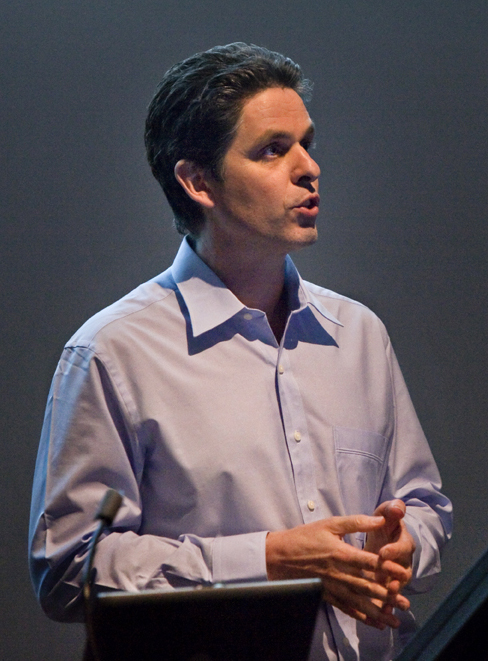Get to Know Geoff Webb

Professor Geoff Webb is the Director of the Monash University Centre for Data Science. He was editor-in-chief of the premier data mining journal, Data Mining and Knowledge Discovery from 2005 to 2014. He has been Program Committee Chair of the two top data mining conferences, ACM SIGKDD and IEEE ICDM, as well as General Chair of ICDM. He is a Technical Advisor to BigML Inc, who have incorporating his best of class association discovery software, Magnum Opus, as a core component of their cloud based Machine Learning service. He developed many of the key mechanisms of support-confidence association discovery in the late 1980s. His OPUS search algorithm remains the state-of-the-art in rule search. He pioneered multiple research areas as diverse as black-box user modelling, interactive data analytics and statistically-sound pattern discovery. He has developed many best-of-class machine learning algorithms that are widely deployed. Professor Webb recently won the 2017 Eureka Prize for Excellence in Data Science in recognition of his research project investigating unification of discriminative and generative approaches to machine learning. Click here to see an announcement on the award and find a short video on his work.
When did you first become interested in computers/technology?
In high school, all of my math classmates wanted me to take a new computing option. It was the first year it had been introduced. I didn’t want to do it, thinking that computers were completely uninteresting, but was forced to. Each week we would write our programs on mark sense cards – filling in a dot for each character in the program and then running them through a card reader before having the computer spit out a list of errors and having to start over.
However, I loved it! I loved the challenge of finding a solution to a programming problem. I loved the precision required – everything must be exactly right. I loved the immediate reward you get when you solve the last piece of the jigsaw and everything works to perfection. The rest is history!
When did you know you wanted to be in this industry as your chosen career?
Choosing computer science was one of the few life choices where I had to put career first. I did a Bachelor of Arts, majoring in both Philosophy and Computer Science. I wanted to continue to higher study and my first love was Philosophy, but I could see that the career prospects were far better in Computer Science, and besides, one can do Philosophy in any discipline. It was a great choice! I have had an extraordinarily fulfilling career as a result.
Is the career you have today what you envisioned you would be doing when you began studying computer science/engineering?
Not at all! I got into machine learning due to a philosophical interest in Artificial Intelligence. At that time, nobody had any idea that it would become such a critical tool – the powerhouse behind at least three of the world’s top ten companies by market capitalization – Alphabet (Google), Facebook and Tencent (the Chinese internet giant). I never envisaged that I would spend a lot of my time applying machine learning to solve practical problems for a wide range of clients.
Why did you join IEEE Computer Society? When did start to get involved with the Computer Society?
I joined as a student. It is my professional body. Of course I need to be a member! I signed up to the computer society while still a student, as it is the home within IEEE of the computer science activities that are most relevant to me.
You recently won the 2017 Eureka Prize. Tell us about the award and the work you are doing to get this distinction.
The Eureka Prizes are annual awards from the Australia Museum. There are 15 categories in total. I received the inaugural Eureka Prize for Excellence in Data Science in recognition of my research project investigating unification of discriminative and generative approaches to machine learning. The citation reads: By bringing together two seemingly disparate approaches to machine learning, Professor Geoffrey Webb has helped forge new avenues of data science research. His work, which has included supporting research into male suicide and a range of diseases, has had significant social and economic impact.
You are currently a Computer Society DVP Speaker through 2019, how would you describe your experience thus far?
I love giving back to the Society that has given so much to me. My favorite experience to date has been a talk to the IEEE student branch of the Open University of Sri Lanka. The branch has a young, enthusiastic and extraordinarily active leadership and the audience of keen and engaged students had a tremendous vibe.
How does being a DVP Speaker support your work?
Sharing my hard-won insights is a core part of my job. The DVP Speaker program broadens the audience with whom I can connect.
Where do you see or what do you hope for computer science/engineering/STEM in the future whether it be 5, 10, 15 years from now?
I am very concerned about the information divide. Of greatest concern is that a relatively small number of corporate entities are gathering extraordinary amounts of information about individuals, and this creates an exceptional imbalance, as we don’t even know what specifics they know, let alone the more important issue of what they can infer from those specifics. The world is highly interconnected, and seemingly innocuous information can provide strong evidence about apparently unrelated issues. I hope that our society can find effective mechanisms to manage this inequality.

Leave a Reply